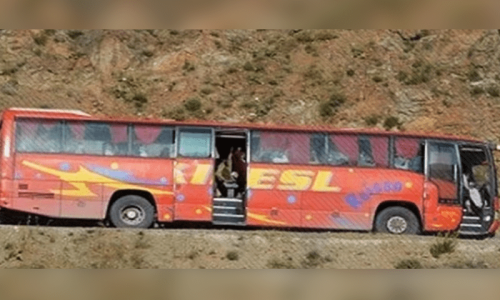PESHAWAR: Chief of the banned Tehreek Nifaz-i-Shariat Mohammadi (TNSM) Maulana Sufi Mohammad was freed from the Peshawar Central Prison on Monday after the imprisonment of over eight years.
On Jan 8, a single-member Peshawar High Court bench had granted bail to Sufi Mohammad in two cases registered in Swat district for sedition, waging war against Pakistan and several other offences.
Of those cases, one was registered at the Kabal police station in 1995 and the other at the Saidu Sharif police station in 2009.
Justice Waqar Ahmad Seth had accepted two petitions of Sufi Mohammad, who has been imprisoned since July 2009, asking him to furnish two surety bonds of Rs700,000 each in the two cases.
Cleric facing two cases will go to hometown after consulting doctors
Due to some error in his release’s order, Sufi Mohammad wasn’t immediately released after the grant of bail.
His counsel, Fida Gul, had then filed an application for the rectification of that error, which was in the date of registration of one of the two cases, and after correction in the release order he was set free.
While the government had been keeping it a close guarded secret as to where Sufi Mohammad had been kept before his release, Mr Fida Gul told Dawn that due to his multiple ailments he was kept at a public sector health facility from where he was shifted to Peshawar Central Prison and after necessary paperwork he was set free.
He said Sufi Mohammad was handed over to his sons one of whom is named as Fazlullah Farooqi.
Sufi Mohammad is also the father-in-law of banned Tehreek-i-Taliban Pakistan chief Maulvi Fazlullah.
The cleric’s son, Farooqi, told reporters that the family had shifted Sufi Mohammad to a private guesthouse and that it would decide about whether to shift his ailing father to his native village in Lower Dir, only after consulting doctors.
He added that after the health of his father improved, they would move to Dir in next few days.
One of the cases was registered on July 30, 2009, after the final phase of the military operation was launched in Swat and other parts of Malakand Division for dislodging militants of the TTP’s Swat chapter. After the operation was launched, the petitioner had started residing at Sethi Town, Peshawar, with his family and was arrested from there with his three sons.
That case pertained to a public meeting addressed by Sufi Mohammad on April 19, 2009, after the TNSM had entered into an agreement with the then Khyber Pakhtunkhwa government. He was charged with sedition as he had termed the then government, Constitution of Pakistan and judicial system un-Islamic. He had also allegedly criticised the state of Pakistan.
He was charged under Sections 120-B (hatching criminal conspiracy), 121-A (waging war against Pakistan), 124-A (sedition), 148 and 149 (rioting) and 506 (criminal intimidation) of the Pakistan Penal Code.
The other case was registered at Kabal police station in June 1995 when Sufi Mohammad and his supporters tried to impose ‘Shariah’ through use of force in Malakand division. The cleric was charged under Sections 121 and 121-A (war against Pakistan), 324 (attempted murder) 341 (wrongful restraint) and 353 (obstructing public servant) of the IPC.
The local police had charged him and his supporters of attacking police force after a public meeting near the Kabal police station.
While police had alleged that his supporters had opened fire, the petitioner had denied that allegations.
At present, Sufi Mohammad and several of his supporters have been facing trial in the two cases in Swat.
Earlier, they were tried in these cases by an antiterrorism court, but the judge had transferred them to a regular court.
After his arrest he was tried in around a dozen of cases in most of which he was acquitted. Most of those cases pertained to 1990s and the successive governments had not seriously tried to prosecute him for offences against the state.
Fida Gul had contended before the PHC bench that his client was 93 years old. He said a medical board constituted by the court had stated that the petitioner had been suffering from multiple ailments, including diabetes, blood pressure, prostrate problem etc.
Previously, Sufi Mohammad was arrested on Nov 20, 2001, in Kurram Agency when he was returning from Afghanistan where he had gone along with thousands of his supporters to wage “holy war” against the US forces. He was subsequently released in April 2008 when the then provincial government had entered into an agreement with the TNSM in which the latter had disassociated itself from attacks on security forces and government installations and assured the government to help it in restoring its writ there.
The then government signed another peace deal with the TNSM in Feb 2009 hoping that Sufi Mohammad would help restore peace in Malakand division, where the militants were calling the shots at that time.
However, that agreement didn’t bear fruit.
Published in Dawn, January 16th, 2018










































Dear visitor, the comments section is undergoing an overhaul and will return soon.